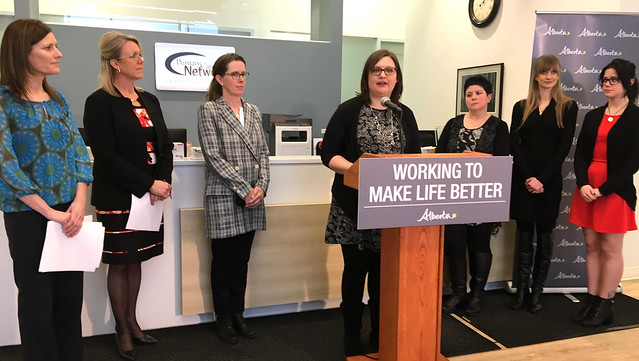This release was issued under a previous government.

Associate Minister Brandy Payne announces new health supports to combat the opioid crisis at the Calgary West Central Primary Care Network.
The $9.5-million provincial grant over three years will support increased access to services and provide training for primary care providers to offer treatment, medication and care to patients and families affected by the opioid crisis.
Doctors, nurse practitioners and primary care providers will be equipped to provide increased access to opioid dependency treatment in community clinics, as well as overdose prevention training and naloxone kits to patients at risk of overdosing or witnessing an overdose.
“Alberta doctors are on the front lines of the opioid crisis. We want to make sure they have the resources they need to treat and support any patient living with an opioid dependency. This investment in primary care services will help families affected by the opioid crisis all across the province and save lives.”
“Alberta’s response to the opioid crisis thus far has included such critical interventions as naloxone kits, more detox beds and safe consumption sites. At this point in time, with the deaths only increasing, we need a broader and deeper initiative that will strengthen our health-care system long term, particularly by challenging stigma and ensuring that family physicians are equipped to provide and facilitate robust mental health care. This includes care for addictions and, most acutely, the problems associated with the use of both prescription and illicit opioids.”
“Anything that our government can do to help remove stigma and ensure that a variety of treatment options are more accessible is a huge step in the right direction. My family’s personal experience with addiction would have been much easier had there been more support and resources in places that are designed to provide care, such as public health offices and through physicians.”
The Alberta College of Family Physicians, along with partners at the Alberta Medical Association, Alberta Health Services and the province’s 42 primary care networks, will use the grant to develop training and educational tools.
The program will ensure family physicians and their teams have the necessary knowledge, tools and resources to provide medically assisted treatment and care to patients, and connect them to counselling and other services.
Medically assisted treatment involves using Suboxone or methadone to treat patients with opioid dependency. Patients affected by acute and chronic pain will also receive enhanced care and new treatment options.
“Family physicians and their patients have a trusted relationship and if a person is interested in discussing opioid use or opioid use disorder, their family physician and primary care teams are there to assist them.”
“Primary care is critically important to the overall opioid response. Treating patients with opioid addiction and use requires a strong partnership between primary care networks, AHS and community partners. This grant will ensure coordinated care so patients get the help they need.”
“Patients and families should feel comfortable and safe speaking about opioid use with their family doctors. Patients need to know they can receive non-judgmental care in community clinics, close to home. We on the opioid commission are pleased the Alberta government accepted our recommendation to support this grant. It will ensure family doctors have the resources they need to treat people with medically assisted treatment. This work will improve patient access to opioid treatment across Alberta.”
About 3,800 physicians at 1,000 clinics linked to primary care networks across the province will have access to the new training programs. These new supports are in addition to new Alberta Health Services opioid dependency treatment spaces now serving patients in Fort McMurray, Grande Prairie, Cardston, Sherwood Park, Edmonton, Calgary and central Alberta.
Expanding access to opioid treatment is key to the government’s work to save lives. The latest opioid data report shows that 562 people died from an apparent fentanyl-related overdose in 2017. In 2016, 358 people died from a fentanyl-related overdose.
Alberta has dedicated $56 million towards urgent actions to address the opioid crisis, including $30 million dedicated to recommendations made by the Minister’s Opioid Emergency Response Commission.
Government continues to address this crisis by:
- Providing operational funding to six supervised consumption services sites approved by Health Canada in Calgary, Edmonton and Lethbridge. These life-saving services opened at Calgary’s Sheldon M. Chumir Centre in late October. In its first three months, there have been more than 4,600 client visits and 90 overdose reversals. Lethbridge’s supervised consumption site opened Feb. 28. Sites in Edmonton are expected to open in March and April.
- Opening new opioid dependency treatment clinics in communities across the province. New spaces in Calgary, Edmonton, Grande Prairie, central Alberta, Sherwood Park and Fort McMurray mean an additional 3,500 people every year can receive this treatment.
- Expanding access to the temporary overdose reversal drug naloxone. As of Jan. 31, 2018, more than 45,500 free naloxone kits have been distributed to Albertans and more than 3,100 overdose reversals have been voluntarily reported.
- Boosting surveillance work done by the Office of the Chief Medical Examiner to do more in-depth reviews of opioid-related deaths. This information will help government and the Minister’s Opioid Emergency Response Commission tailor their actions and plans moving forward.